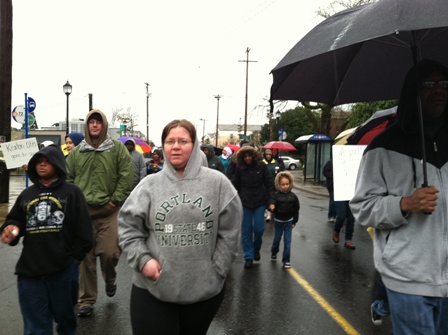 The rain didn't keep people away from a march in solidarity with the family of Trayvon Martin last Saturday on North Killingsworth Street. The event was called by Portland mayoral candidate Cameron Whitten. Helen Silvis photo The rain didn't keep people away from a march in solidarity with the family of Trayvon Martin last Saturday on North Killingsworth Street. The event was called by Portland mayoral candidate Cameron Whitten. Helen Silvis photo |
In response to the Trayvon Martin shooting, around 80 men and 20 women gathered at Self Enhancement Inc. (SEI) this past week to discuss police brutality and strategic action in the Black community.
"We wanted to meet and figure out what people can do individually to change their communities," says Blake Dye, organizer of the event. "I don't think the Black community in Oregon communicates well. There are a lot of people of common interest but we just don't know it."
The event, billed as "The Conversation," was put on by the Phi Beta Sigma, a fraternity that runs on a social justice platform.
Males of different ages, backgrounds, occupations and faiths attended the event. Dye dismissed members of the major news media so participants would feel more comfortable expressing their views and emotions.
The meeting began with an outpouring of anger at not just the Trayvon Martin shooting, but the killings of Black men, specifically in Portland.
"There was a lot of pain in the room," says Dye. "People needed to be heard. They needed other Black men to hear who they were."
Some men shared experiences of having family members killed while others expressed thoughts on the age gap. One man even proposed entering the bicycle industry to spur economic empowerment, after telling his story of working for years at Freightliner.
While Dye acknowledges that the sharing of emotions was important, he says he didn't want it to be two hours of emotional rehashing.
The men broke into three groups to discuss specific ideas and strategies. These smaller groups were facilitated by the three main speakers of the event, Johnny Lake, Andrae Brown and Marcus Sharpe. Some of the topics included family, community and police brutality.
Each smaller group developed a list of ideas to present to the larger group when it reconvened at the end of the event.
Debates over some topics were heated but Dye says they produced a number of productive ideas.
One plan that came out of the family and community discussions was the need for parents to create a language to better communicate with teachers and school administrators. This was part of a larger discussion on the importance of getting involved in children's education because students today don't see the value of it as much as past generations.
Another point that was discussed in detail was the need to get involved in local government.
Dye, who sits on the Marion County Sheriff's Community Adviser Board, uses himself as an example.
"There are 16 members and I'm the only Black person," he says. "My presence is important so they understand that the Black community cares."
Lastly, speakers and participants in "The Conversation" encouraged attendees to get involved in organizations in the community, including the Urban League, gang outreach and mentoring programs.
"Our goal wasn't to create another organization," says Dye. "We wanted to reinvigorate the organizations that already exist in the community. There's a job for everyone."
Originally, the event was billed as a Black male's meeting. However, a number of women responded to the invitation, so a separate classroom was used to facilitate a question and answer session between them.
"From the point of view of the men, they were happy to be among themselves," says Teressa Raiford, who did marketing for "The Conversation."
Raiford said there were a number of spirited conversations on topics that included what women expect from the men in their communities and what women can do collectively to enact change.
She says there was a heated debate among different generations of women about the role of men. Specifically, she says older women came with the point of view that men should already have certain values instilled in them while younger women argued that younger men were not taught some of the values of the older generation due to a different upbringing.
Another major topic was having discussions with Black children on how they will be perceived by the police and authority figures.
"I had to have a discussion with my son about why it's not safe to jog at 4:30 in the morning," says Raiford. "He thought it was his clothes and told me his gear was fine. I had to tell him that the gear was his skin.
"There is a certain generation that doesn't want to hear it. It's hard to have that discussion because it affirms a lack of value. Our goal was to figure out how to direct this info to our children without telling them they have no self worth."




















































































































































































































































































































